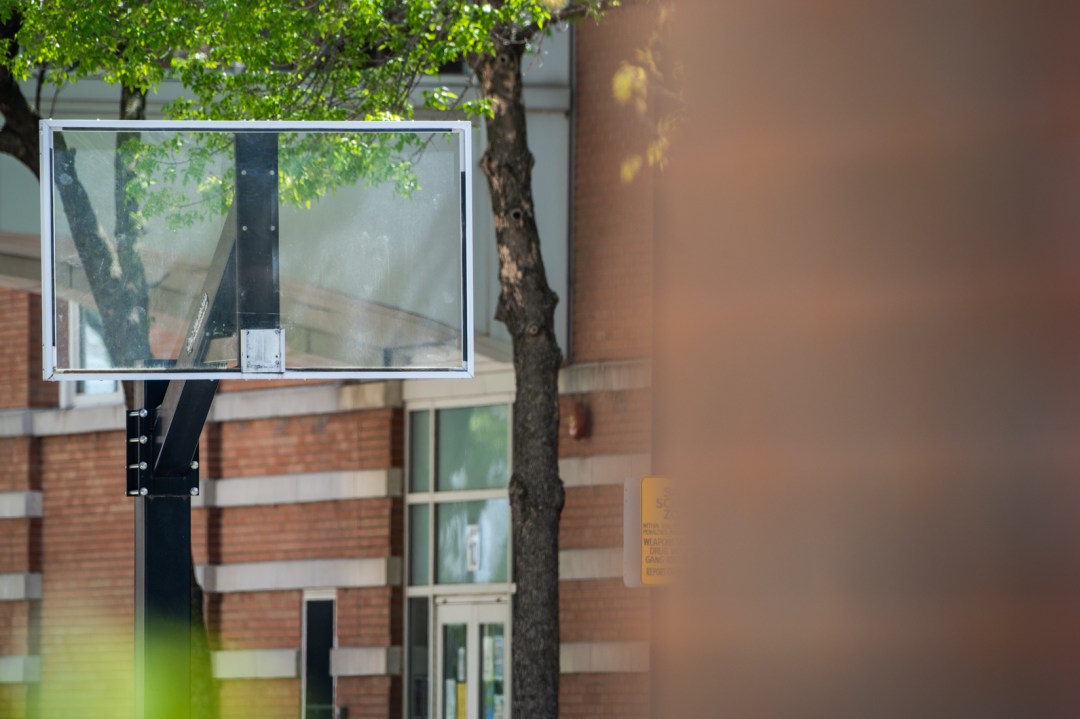Sports
As Basketball Hoops Vanish From Near South Side Campus, Activist … – Block Club Chicago

Become a member
Learn more
Become a member
Learn more
The National Teachers Academy began removing hoops when class was not in session after adults made a mess of the courts, officials said. "The safety of the students had to come first."
NEAR SOUTH SIDE — Officials at a Near South Side school have for years removed its basketball hoops from the court at night and on weekends, saying it’s a safety precaution.
But a prominent activist said it’s just another way the city is withholding resources while young people and neighbors look for safe ways to stay occupied and have fun.
Anti-violence activist Jahmal Cole, who leads My Block, My Hood, My City, said he’s often seen people playing basketball at National Teachers Academy, 55 W. Cermak Road, when he goes by weekdays. He stopped by the court for a quick game Sunday — and was surprised to find its hoops and nets gone, he said.
Cole posted about the missing hoops on social media. The responses were telling, he said.
“A guy who worked at the school told me that the reason they’ve been taken down is because of the adults. They use the court but don’t clean up after themselves. Liquor bottles, weed, weapons, etc. would be left out there, so the school decided to take it down,” Cole said.
Chicago Public Schools spokespeople said in a statement school administrators oversee use of the basketball court. Principal Teneka Brooks declined to comment.
The rims are portable and are usually attached to the permanent basket stanchions for students to use during school and school events, CPS spokespeople said. They are removed weeknights and weekends when school isn’t in session, officials said.
The court is not in a public park and is meant to only be accessible by students during school hours, at school events or for summer school and camp, officials said.
But some neighbors commenting on Cole’s post expressed dismay the hoops aren’t being made available to young people and others outside of those times — especially as young people have faced heavy criticism from some for gathering in large numbers Downtown and at beaches during nice weather.
Cole said officials should be providing young people and others with resources in their own neighborhoods so they don’t have to go elsewhere to find things to do.
Removing the rims “is not related to any specific concerns or issues in the school community and has nothing to do with historical practices of keeping marginalized people out of recreational spaces,” CPS spokespeople said in a statement.
The CPS spokespeople said the school’s families bought the rims and donated them to National Teachers Academy for their own students to use.
Marquinn McDonald, a violence prevention organizer and National Teachers Academy parent, told Block Club the move to restrict the court to students was a matter of safety and maintenance. He said the school began taking down the rims outside of school hours in 2019, and it was done at parents’ request.
“There was a point when it was open to the public, but then people would come, play a game and leave all their trash behind,” McDonald said. “Then we had people hanging out in or sleeping close to the bushes nearby. The safety of the students had to come first.”
The hoops were not attached to the backboards when a Block Club reporter visited the campus during school hours Tuesday. McDonald said they’re removed immediately after the school’s last recess.
McDonald said he admires Cole and appreciates the work he does, but he thinks Cole’s concerns are unfounded in this case. The lack of cooperation from the community to clean up after themselves was mainly to blame for the restrictions on the hoops, he said.
McDonald also thinks it’s a matter of avoiding liability for the school.
“If someone who isn’t a NTA student is hurt, who does that fall on? Are they going to sue the city? CPS? Who would suffer the consequences?” McDonald said.
There’s also the matter of the neighborhood itself.
The National Teachers Academy is part of an area that’s long been at the center of concerns about gentrification. The land was once part of the Ickes Homes public housing development, and former residents have been fighting for years to return. Though officials promised to build replacement homes, those developments are years behind schedule and now plans are already underway to build a new high school nearby. Some community leaders have demanded the promised housing be built first, while others have pushed for investment in existing schools instead of spending money on a new one.
Cole said some people replying to his post said there were concerns the court at the school could attract “thugs,” and they think removing the hoops keeps them away.
That goes back to a decades-old problem in Chicago, as residents and community leaders have debated the need for public recreation versus concerns about safety.
In 1990, Ben Joravsky for the Reader reported that Hyde Park and Kenwood neighbors clashed for over a year after some wanted Kenwood Community Park hoops taken down because players were too rowdy at night. More outdoor courts closed as residents complained, even as the game got more popular.
In 2011, Mick Dumke and Kevin Warwick reported for the Reader how then first-term Ald. James Cappleman (46th) ordered two basketball hoops in the Broncho Billy playlot taken down to ward off gang activity. Opponents said the alderman was pushing to gentrify the area as gang violence continued without the hoops. Park officials brought back the hoops after a few months.
In 2018, Block Club reported that residents were greeted by steering wheel locks on basketball hoops when they attempted to use the court at the Barbara Jean Wright Courts apartment complex in University Village. Residents were given a variety of reasons for the decision, from “preventing the disruption of seniors living nearby” to discouraging residents from the Chicago Housing Authority’s ABLA/Brooks Homes from using them.
The locks remained throughout the summer and fall at the behest of the complex’s management, who said they could only be removed at the residents’ request. But when residents sought out the person in charge to make the request, they couldn’t. Neighborhood teens were forced to travel to Pilsen to play.
A Reader report in 2020 found the Park District quietly removed 12 of 16 basketball courts in neighborhoods that had doubled and tripled in value, sparking concern from residents worried about displacement. The Reader discovered the majority of the city’s public basketball courts on the North and West sides — in rapidly gentrifying communities — had been taken away, leaving teens little choice but to cross the border to suburban Evanston to play.
During the early days of the COVID-19 pandemic, Ald. Howard Brookins (21st) ordered the removal of rims in his ward to keep people from congregating on the court, citing health concerns. Brookins told Block Club in 2020 he was forced to make the decision after seeing more than 80 people gather at the courts for a game. The rims remained gone for the duration of the stay at home order.
What also has permeated these debates over the years are pleas that people, particularly young Chicagoans, need safe places to gather and play.
Increasingly, though, those spaces are dwindling.
Last year, Mayor Lori Lightfoot banned unaccompanied minors from Millennium Park Thursday-Sunday nights after a teen was fatally shot there. She encouraged young people to seek out recreation in their neighborhoods, but that came as the Park District’s lifeguard shortage eventually only allowed for the city to open half its public pools and some of its beaches.
Community leaders told Block Club the city needs to invest in boosting local programs and activities for young people.
Those same issues have reemerged this April when three teenagers were wounded in shootings as large groups gathered Downtown and on the lakefront last month.
Given those problems, it would make sense to provide young people with resources in their own neighborhoods, Cole said.
The activist has launched an initiative, #SaveStreetball, to replace missing rims and nets in basketball courts across the city. Residents can share the name and address of the court — along with the name of their alderperson — in a Google form and donate to the cause. Cole said he’s received 75 requests.
Cole installed his first set of hoops Tuesday on the Far South Side, replacing ones that had long disappeared from the Riverside Village housing development.
“All of these little things matter,” Cole said. “You take everything away from people, including these activities where they can have fun, and you expect them to stay out of trouble. There is a lack of resources, and it’s disgusting. It’s not fair to keep making youth the scapegoat.”
Subscribe to Block Club Chicago, an independent, 501(c)(3), journalist-run newsroom. Every dime we make funds reporting from Chicago’s neighborhoods.
Click here to support Block Club with a tax-deductible donation.
Thanks for subscribing to Block Club Chicago, an independent, 501(c)(3), journalist-run newsroom. Every dime we make funds reporting from Chicago’s neighborhoods. Click here to support Block Club with a tax-deductible donation.
Watch our “On The Block” TV show on The U, CW26 and MeTV.
Listen to “It’s All Good: A Block Club Chicago Podcast”:
jamie@blockclubchi.org
The market organizer called off this weekend's event after the city denied expansion plans she said would make the event safer. But vendors said they will lose key profits and have nowhere to sell harvested produce.
Thursday's flag raising and Saturday's march will commemorate 32 years since Ukraine became an independent nation — and show a united front against Russia's ongoing invasion.
This is the second-highest heat index on record for the city and the highest temperature logged on Aug. 23 in any year.
Teachers, parents and union organizers said they are managing the tough conditions, but it's time for the district to commit to long-term upgrades instead of "quick fixes and bandaids."









